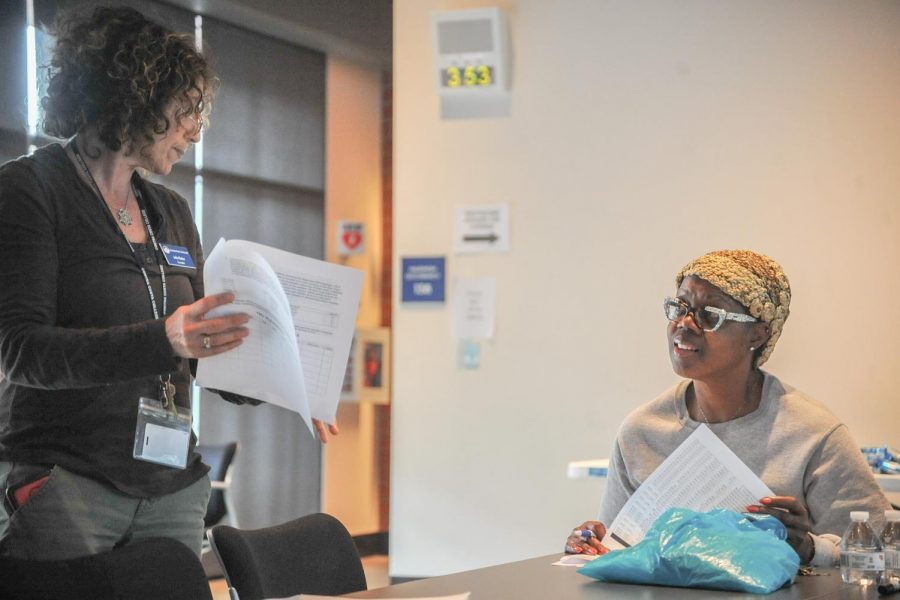Smoke impacts calendar
EOPS counselor Julie Skoler (left) helps a student during a compressed calendar informational session workshop at Fireside Hall at the end of the 2017 spring semester.
Dec 5, 2018
As faculty, staff and students returned Nov. 26 from an impromptu 10-day recess due to the closure of the campus because of hazardous air quality from the Camp Fire in Butte County, they realized the newly-established 16-week calendar was adding hiccups to the completion of their coursework.
This unforeseen interruption, particularly in classes and labs that meet once a week, has threatened the minimum number of instructional hours. Losing too many hours from scheduled lecture and lab times could lead to possible violations of the Title V Carnegie Unit, Education Code rule.
For students, this means the inability to earn credit for course completion.
“Fewer than 10 classes were negatively impacted with respect to hours of instruction and those faculty members are working directly with their students,” CCC President Katrina VanderWoude said.
“Additionally, whether the minimal (amount) of course time was impacted or not, our faculty are committed to working with all students who had to miss class time, lectures and labs due to the closures.”
Implemented throughout the Contra Costa Community College District for the first time this fall, the compressed calendar reduced the semester length from 18 weeks to 16 weeks.
The move to a shorter academic calendar resulted in necessary adjustments to instructional hours each student is required to have per course according to the Carnegie unit guidelines.
For a three-unit History 120 course that meets 14 times each Monday throughout a semester, a total of 49.25 hours is required.
With the district’s switch to the 16-week compressed calendar, these once a week courses, typically Monday, Friday, Saturday or Sunday, are already at the minimum threshold for students to receive credit.
However, because of the unexpected cancellation of classes and the subsequent campus closure from Nov. 15 to 25, the required hours needed for some courses falls below the threshold.
“The college has carefully assessed all requirements related to the college course hours and those standards,” Dr. VanderWoude said. “We had to consider all facets of the student experience, including loss of class time, make up of class time, ability to complete courses successfully and, of course, many personal considerations.”
Biology department Chairperson Ellen Coatney said the compressed calendar and cancellation of classes due to poor air quality has put major strains on her physiology and biology courses and students.
“The fires had a huge impact here. Every single class was impacted, but we made adjustments,” Coatney said. “Losing a day in a 16-week semester verses a day in an 18-week semester, there’s a big difference in the percentage of time lost.”
Coatney said in addition to two of her lab sessions being canceled, she lost lectures, class presentations and even had to reschedule quizzes.
On Nov. 18, a campus email was sent to faculty and staff by Academic Senate President Beth Goehring highlighting alternative solutions for making up the crucial lost hours.
This included additional assignments on Canvas (online learning platform), video lectures and view-and-response papers. “The list was only ideas and was not mandatory for faculty to do those particular things,” Goehring said. “It was to get faculty thinking about what would work for their particular classes.
“Faculty are doing a good job at figuring out what’s going to work for them and their students in terms of making sure they are getting the correct number of hours for course completion.”


